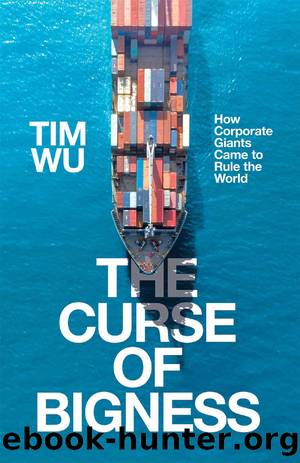The Curse of Bigness by Tim Wu

Author:Tim Wu
Language: eng
Format: epub
Publisher: Atlantic Books
The Break-Up of the Worldâs Largest Firm
In 1974, AT&T was the largest firm on the planet, the employer of over a million people, and the uncontested holder of a monopoly that had, by then, lasted a full six decades. Created by J. P. Morgan, it was the most important and powerful incarnation of the corporatist vision; the colossus restrained, its activities carefully regulated by the Federal Communications Commission, under the banner of âregulated monopolyâ.
Life, in other words, was fine for the worldâs greatest blue whale, until 1974, when the White House announced a surprising change in policy. âUnless the would-be monopolist [AT&T] or the public can demonstrate special public policy considerations that justify monopoly, it should not be permitted.â108 Later that same year, the Justice Department filed suits against AT&T, producing the largest and perhaps most consequential case in the entire history of the competition laws. This resulted in the last massive break-up, and arguably the most successful in terms of its effect on the American economy, of the post-war era.
We should be a little more precise: AT&T was not the mere holder of a monopoly, but multiple monopolies â six or seven, depending on how one counts â making it the quintessential âsuper monopolistâ. At its height the firm controlled local telephone services, long-distance services, the physical telephones, all other attachments, business telephone services and markets just coming into existence, including âonlineâ services.
Nowadays, even dominant firms at least pay lip service to the importance of competition. Not so with AT&T, which even at the time was unusual in its ideological dedication to monopoly rule. That was a tone set by AT&Tâs first true ruler, Theodore Vail, who had made his reasoning moralistic, arguing that competition was giving American business a bad name: âThe vicious acts associated with aggressive competition are responsible for much, if not all, of the present antagonism in the public mind to business, particularly to large business.â109
Over the years, AT&T had not been content to be merely the neighbourhood telephone monopolist. No, AT&T was the jealous God of telecommunications, brooking no rivals, accepting no sharing, and swallowing any children with even the remotest chance of unseating Kronos. As it insisted to the Federal Communications Commission (FCC) in 1968, competition was inconsistent with its very mission of running a phone system: hence, the Bell companies âmust have absolute control over the quality, installation, and maintenance of all parts of the [telephone] system in order effectively to carry out that responsibilityâ.110 Much trouble came from this deep aversion to competition. Almost as if unable to help itself, it did everything it could to kill MCI, a tiny rival that used microwave towers to offer cheaper long-distance services, along with trying to block anyone daring to offer a service competing with Bellâs telephones.111 Over the 1970s, the firm became even more aggressive in its attacks on competitors, despite the ongoing investigation. Its seventh decade would be its last.
One of the real triggers was political, even constitutional. The Justice Department felt that AT&T had become a rival to the state, showing itself resistant to government control.
Download
This site does not store any files on its server. We only index and link to content provided by other sites. Please contact the content providers to delete copyright contents if any and email us, we'll remove relevant links or contents immediately.
Life 3.0: Being Human in the Age of Artificial Intelligence by Tegmark Max(4495)
The Sports Rules Book by Human Kinetics(3582)
ACT Math For Dummies by Zegarelli Mark(3559)
The Age of Surveillance Capitalism by Shoshana Zuboff(3413)
Blood, Sweat, and Pixels by Jason Schreier(3128)
Unlabel: Selling You Without Selling Out by Marc Ecko(2976)
Urban Outlaw by Magnus Walker(2947)
Hidden Persuasion: 33 psychological influence techniques in advertising by Marc Andrews & Matthijs van Leeuwen & Rick van Baaren(2772)
The Pixar Touch by David A. Price(2737)
Bad Pharma by Ben Goldacre(2724)
Project Animal Farm: An Accidental Journey into the Secret World of Farming and the Truth About Our Food by Sonia Faruqi(2656)
Brotopia by Emily Chang(2589)
The Content Trap by Bharat Anand(2489)
Slugfest by Reed Tucker(2413)
The Airbnb Story by Leigh Gallagher(2364)
Kitchen confidential by Anthony Bourdain(2299)
Coffee for One by KJ Fallon(2003)
Smuggler's Cove: Exotic Cocktails, Rum, and the Cult of Tiki by Martin Cate & Rebecca Cate(1978)
Beer is proof God loves us by Charles W. Bamforth(1915)
